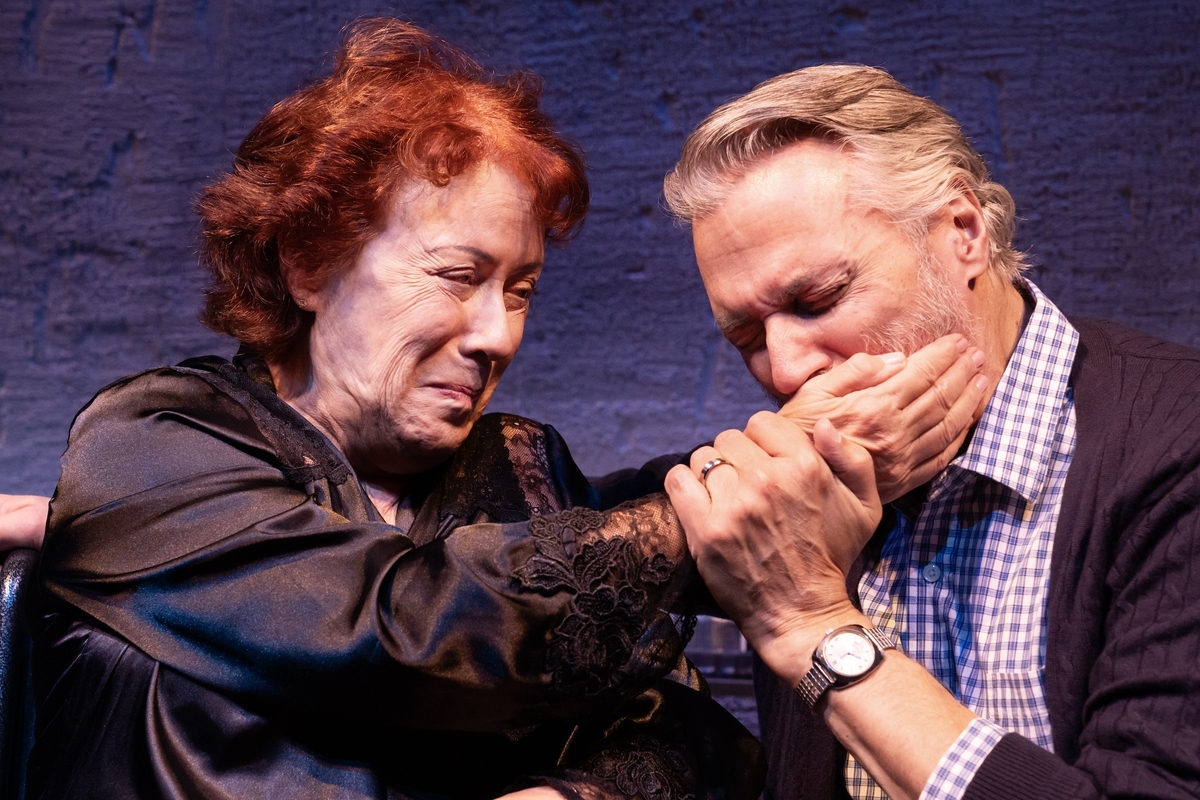NYC
‘Til Death We Do Past
by | Dec 4, 2023 11:48 am
Post a Comment | E-mail the Author
Posted to: Theater

Julieta Cervantes Photo
Judy Kaye, Robert Cuccioli in 'Til Death.
‘Til Death
Abingdon Theatre Company
Written by Elizabeth Coplan
Directed by Chad Austin
Theatre Five at Theatre Row
410 West 42nd St., NYC
Through Dec. 23, 2023
Parenthesizing every moment of lived life are two voidful tracts of time. One is known, and it follows a person in their progress through slink of seconds toward the other great, empty space. This empty space is an endless unknown tract, or at the very least unexperienced, it is dark and, for some, glittered with hope. These two stretches of time are one’s past and one’s death:
‘Til Death, a new play written by Elizabeth Coplan, is about the encroaching of this second void and reconciliation with the former.
Mary, played by the stellar two-time Tony award winner Judy Kaye, has found out that her brutal ovarian cancer has come out of remission and is ravaging her body far more violently than it did previously. Given her age, 75, the horrors of chemo treatment and ruined quality of life, she opts for voluntary euthanasia in lieu of waging war with the inevitable. In the wake of her decision (pun partially intended) Mary’s family gathers in her home to see her off. Forever feuding daughters, Anne and Lucy, come to cramped conflict with Michael, Mary’s husband of four years, all venting and unloading their pasts in preparation for the certainty of a grief-filled future.
The meat of the play is a Baumbach/Stillman-adjacent chamber piece wherein Mary’s family gathers to see her off in the hereafter. Overseen by her husband and two daughters, and interrupted by her son and grandson, Mary’s final days start smoothly enough.
A lesser writer than Coplan would have milked the voluntary euthanasia angle for all it was worth. It would have been easy enough to render a plot around a will-she-won’t‑she back and forth concerning the morality of “suicide,” riling up each character into their own spirited monologue about their mother’s choice of fate. Luckily, Coplan opted to write Mary headstrong enough to have the audience trust her decision, and the drama of the play hinges principally not on her making the decision but on everyone else’s process of early grief.
Instead of creating a morality play, Coplan and company have given us an hour and ahalf of tender moments, piqued arguments, and exchanges of conclusive wisdom regarding life as it is lived. That’s not to say any of it is trite or saccharine — at the center of it all is the dying Mary who, in some way, attends her own wake, witnesses simultaneously her eulogy and its refutation.
Daughter Lucy, played with a knify shimmer by Amy Hargreaves of Homeland and 13 Reasons Why fame, initially approaches the whole affair with pragmatism, opening the second scene by reading the instruction manual for the administration of Mary’s death regimen.
Then there’s Whitney Morse’s Anne, the youngest daughter, the artist in the family who insists that her paintings are not “self-portraits, but allegories,” performing a sentimental foil to her sister’s crass objectivity. Of course, as it should, these relationships and perspectives are flipped by the end.
And here’s where the real work of Coplan’s writing, Chad Austin’s direction, the cast-at-large’s performance come to their fullest powers. These heavy, traumatic shifts in character. It’s no secret to anyone who’s dealt with death in the family that at some point in the grieving process the protective layers of one’s identity, all outer appearances, behavioral ticks, and themes of one’s character, are sloughed away and the soft, fearful reason for their construction is laid bare.
This is the primary operation at play in ‘Til Death. Whether it’s Lucy’s lawyerly terseness, Anne’s artistic airs, husband Michael’s (played with pitch perfect sugar and cringe by Robert Cuccioli) joking, jibing, and grin, it’s all put on, built by the character’s fears and shames. And it’s all torn to rubble, whether by the revelation of secrets or the intolerable situation at hand.
‘Til Death situates its characters firmly in that parenthesized space between what was and what will no longer be. As the inevitability of Mary’s day increases, so too does immutability of the past. The bulwark of its character’s personalities — their careers, faith, political ideologies, moral principals — is brought crumbling and, in their mother’s passing, their wife’s passing, grandmother’s passing, all are in some way purified, souls finally naked enough to touch and understand.
The lights went down. And came up. At bows, we were all a puddle with each other. Tears streaking every cheek.